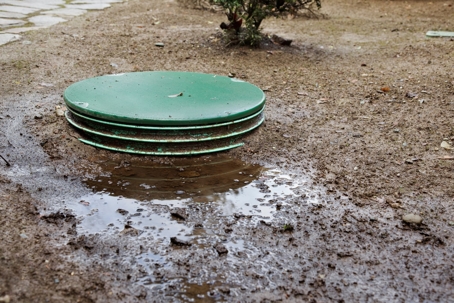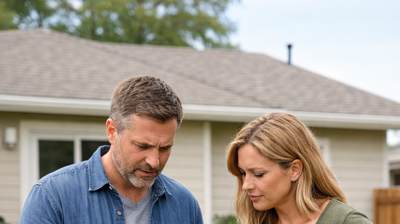Table of Contents
- What Does a Failed Sept System Mean?
- Why Would a Septic System Fail?
- What to Do If Your Septic System Has Failed
- What to Do If Your Home Failed a Septic Inspection
- Can I Live in a House with a Failed Septic System?
- Understanding Your Septic Repair vs. Replacement Options
- Does Homeowners' Insurance Cover Failed Septic Systems?
- Schedule Your Septic Inspection
Something's wrong with your septic system, and you know it.
Maybe it's the backups—multiple drains that suddenly won't clear. Maybe it's the smell in your yard that gets worse every day. Or maybe everything seemed fine until an inspector delivered bad news about a septic system that's now threatening your next move.
Whether it's one of these scenarios or any of the other telltale signs of septic system failure, you're not the first homeowner, buyer, seller, or real estate professional to experience it. It’s a problem that can feel overwhelming, but it’s a problem with solutions.
At Wind River Environmental, we've helped thousands of homeowners across the East Coast navigate septic emergencies and inspection failures, and we're here to walk you through exactly what to do next.
What Does a Failed Septic System Mean?
Let's start by clarifying what we're actually dealing with.
A "failed" septic system doesn't necessarily mean your entire system needs replacement, although that's what many panicked homeowners initially assume.
Septic system failure means your system can no longer properly treat and dispose of wastewater.
A failed septic system could manifest as sewage backing up into your home, wastewater surfacing in your yard (especially over the drain or leach field), or consistently slow drains throughout your house.
The septic failure might stem from a clogged pipe, a saturated drain field, a damaged septic tank, or simplyyears of neglected maintenance finally catching up.
Minor Issues vs. Complete Failure
It's important to distinguish between minor issues and true system failures.
A single clogged drain or slow toilet doesn't necessarily mean your septic system has failed. It might just be a plumbing issue.
However, are multiple fixtures draining slowly, is sewage backing up, or do you notice pooling water and odors near your drain field? If so, you're likely dealing with an actual septic failure that requires professional intervention.
The severity can range from relatively simple fixes (like pumping an overflowing tank or clearing a clogged septic system) to major repairs (like drain field replacement).
This is why getting a professional assessment is crucial. You don’t want to assume the worst until an expert evaluates your specific situation.
Why Would a Septic System Fail?
Understanding what causes septic system failure can help you make sense of what's happening and prevent future problems.
The most common culprits of septic system failure include:
- Lack of Regular Maintenance. Skipping routine pumping every 2-3 years allows solids to accumulate and eventually clog the system or overflow into the drain field.
- System Age. Most septic systems last 20-30 years with proper care, but even well-maintained systems eventually wear out.
- Overloading. Adding bedrooms, increasing household size, or using excessive water can overwhelm a system that wasn't designed for the increased load.
- Tree Root Intrusion. Roots seeking water and nutrients can infiltrate pipes and tanks, causing cracks, blockages, and structural damage.
- Improper Installation. Systems that weren't sized correctly or installed properly may fail prematurely, sometimes within just a few years.
- Drain Field Issues. Soil compaction from vehicles, excessive water saturation, or biomat buildup can impede the drain field's ability to filter wastewater effectively.
- Harsh Chemicals and Products. Antibacterial soaps, excessive bleach, and non-biodegradable items kill beneficial bacteria and clog the system.
- Physical Damage. Construction work, heavy equipment, or even persistent parking over the drain field can crush pipes or compact soil.
Most failures result from a combination of factors rather than a single cause. A professional septic inspection will identify the specific issues affecting your system and help determine the most cost-effective solution.
What to Do If Your Septic System Has Failed
Are you experiencing active septic failure, including sewage backup, strong odors, or standing water in your yard?
If so, here's what you should do:
Stop Using Water
Every flush, shower, or load of laundry you run is making the problem worse. Minimize water use until a professional can assess the situation. If the backup is severe, consider staying elsewhere temporarily.
Contact a Professional Septic Service Provider
This isn't a DIY situation. Contact Wind River Environmental or your local septic professional for emergency service. We're available 24/7 because we know your septic emergencies don't wait for business hours.
Keep People and Pets Away
Raw sewage contains harmful bacteria and pathogens.
Keep children and animals away from any standing water or wet areas in your yard, and avoid contact with backed-up sewage in your home.
Document Everything
Take photos and videos of the problem areas, note when issues started, and save any maintenance records you have. This documentation may be important for insurance claims or if you're selling the property.
Resist the Urge to DIY Fixes
While you might be tempted to rent an auger or try chemical treatments, these can actually worsen the problem or make professional repairs more difficult. Let your local septic experts handle it.
Prepare for the Inspection
Before the technician arrives, locate your septic tank and drain field (if you know where they are). Your septic company can help you find your tank and drain field.
Also, gather any previous inspection or pumping records, and be ready to describe when you first noticed problems.
The key is to act quickly and call professionals immediately.
The longer sewage backs up or pools in your yard, the more damage occurs and the more expensive the repairs become.
What to Do If Your Home Failed a Septic Inspection
Finding out your septic system failed inspection during a real estate transaction adds extra pressure and complexity.
Whether you're buying or selling, here's how to navigate this situation:
- Get a Detailed Written Report.Request a comprehensive inspection report that specifies exactly what failed, why it failed, and what's needed to bring the system into compliance. Vague "system failure" descriptions aren't helpful for negotiations or repairs.
- Obtain Multiple Professional Quotes. Don't rely on just one estimate. Get 2-3 quotes from reputable septic companies for the recommended repairs or replacement. Prices can vary significantly, and multiple perspectives help ensure you're getting fair pricing.
- Understand Your Service Options.Not all "failures" require complete system replacement. Sometimes targeted repairs—like replacing a baffle, adding risers, or pumping and cleaning—can bring the system into compliance. Your septic professional should explain whether repair is viable or replacement is necessary.
- Review Local Regulations and Permit Requirements.Septic repairs and replacements typically require permits and inspections. Your septic company should handle this, but understanding local requirements prevents surprises during negotiations.
- Negotiate Appropriately if You're Buying or Selling. For sellers: expect buyers to request either repairs before closing or a credit to handle repairs themselves. For buyers: decide whether you want the seller to fix it (ensuring it's done right) or take a credit (giving you control over the contractor). Consider inspection contingencies and realistic timelines.
- Factor in Realistic Timelines. Septic repairs or replacements can take 2-4 weeks or longer, depending on permits, weather, and contractor availability. Don't agree to closing dates that don't allow adequate time for proper repairs.
For real estate professionals managing these situations, having trusted septic resources to share with your clients is invaluable.
Check out our real estate resources and tools for guidance on navigating septic issues during transactions.
Can I Live in a House with a Failed Septic System?
Technically, you might be able to occupy a house with a failed septic system for a short time, but it's neither safe nor legal in most jurisdictions.
If your system has failed, prioritizing repairs isn't optional; it's essential for your family's safety and your legal protection.
Health Dangers
Living with a failed septic system exposes your family to serious health hazards, including bacterial infections, waterborne illnesses, and toxic gas exposure from sewage backup.
Legal Consequences
Beyond health risks, there are legal consequences to consider.
Many local health departments require functioning septic systems and can issue violation notices, fines, or even condemnation orders for properties with failed systems.
You cannot legally sell a home with a known failed septic system without disclosure, and your buyers will require repairs before closing.
Environmental Impact
The environmental impact shouldn't be ignored either.
A failed septic system contaminates groundwater, potentially affecting your neighbors' wells and local water supplies. You could be held liable for environmental damage and required to pay for remediation beyond just fixing your system.
Understanding Your Septic Repair vs. Replacement Options
When facing septic system failure, cost understandably becomes a major concern.
Here's the good news: the cheapest septic option isn't always a full replacement. In many cases, targeted repairs can fully restore system function for a fraction of replacement costs.
Simple fixes, such as pumping an overfull tank, replacing damaged baffles, or repairing a section of sewer pipe, are often all that's needed.
More significant repairs, like adding risers or replacing the distribution box, can solve the problem without replacing the entire system.
Complete system replacement is only necessary in cases of total failure.
Don't let fear of replacement costs prevent you from getting an inspection. Many homeowners are relieved to discover that their "failed" system just needs pumping and minor repairs, rather than a complete overhaul they feared.
Does Homeowners' Insurance Cover Failed Septic Systems?
Unfortunately, standard homeowners' insurance policies typically don't cover septic system failure. But there are important exceptions worth understanding.
Most policies specifically exclude damage caused by maintenance-related issues, wear and tear, or gradual deterioration, which describes most septic failures.
Some Circumstances May Be Covered
However, insurance may cover septic damage in certain scenarios.
If a sudden, accidental event causes the failure (like a tree falling and crushing your tank during a storm, or a vehicle accidentally driving over and damaging your drain field), your policy might provide coverage.
Some policies also cover damage to your home's interior caused by unexpected sewage backup. This usually requires a separate sewer backup endorsement.
Before assuming you have no coverage, review your policy and contact your insurance agent to discuss your situation.
Even if the system failure itself isn't covered, related damage might be—but you won't know unless you ask.
Start with a Septic System Inspection from Wind River Environmental
Septic system failure is undeniably stressful, but it's a solvable problem.
The key is taking immediate action, getting professional assessments, and making informed decisions based on expert advice rather than panic. The sooner you address the problem, the more options you'll have and the less expensive the solution typically becomes.
Whether you need emergency repairs, system replacement, or guidance navigating a failed inspection during a real estate transaction, Wind River Environmental has the expertise and resources to help.
You'll work with licensed technicians who've handled thousands of septic emergencies and know exactly how to fix your specific situation. We're here to help you navigate this challenge with clear solutions and transparent service.
Don't let a failed septic system disrupt your life any longer—find your nearest Wind River Environmental location and get the expert help you need today.





